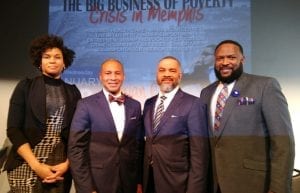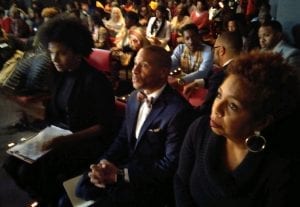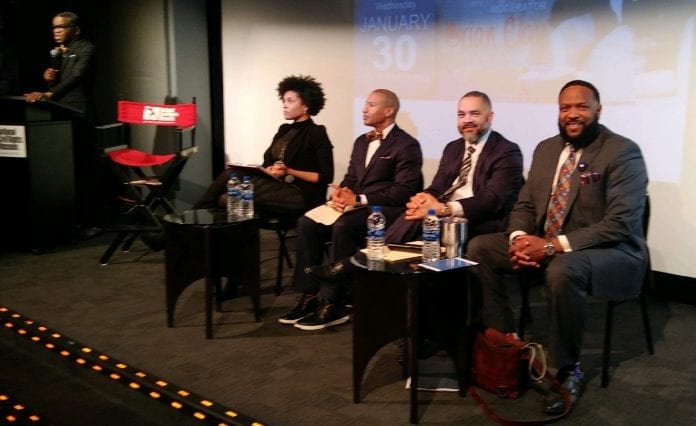Mass incarceration of African Americans in Memphis and Shelby County has “kept us in poverty,” according to Dr. Demetria Frank, associate professor of law at the University of Memphis and executive director of Project MI (Mass Incarceration).
“Putting people in jail keeps us in poverty by creating employment obstacles, income gaps, the labor force is locked up, and dollars spent in the community are not there,” said Dr. Frank. “There is abject lack of wealth perpetuated in the community, and we need to fully appreciate the connectivity of mass incarceration and poverty.”

Frank was joined by three other panelists featured in The Brian Clay Chronicles 2019 return, “The Big Business of Poverty: Crisis in Memphis.” Shelby County’s newly appointed Director of Education Cedrick Gray; Mark Yates, chief visionary officer of the Black Business Association, and Pastor Rickey Floyd of The Pursuit of God Transformation Center and curriculum facilitator of the City of Memphis’ new initiative, Manhood University rounded out platform speakers exploring ways of breaking the cycle of poverty.
All agreed. There is no one fix to effectively address poverty. Moderator Brian Clay allowed each panelist time to address the symptoms of poverty in light of their unique area of expertise.
“The educator believes that the answer is in education. The politician believes that the way out of poverty is politics. The basketball player believes it’s basketball…Preachers believe that the answer is Jesus,” said Floyd, who called himself a “wealth-conscious activist” and a “poverty escape trainer.”
“There is no one fix for poverty. We can’t get the right answer by asking the wrong question. We must all sit down together like a village. There must be a vision for where there is no vision, our people perish.”
Gray cited a moment of revelation in his former position as superintendent of schools in Fayette County.
“I was visiting a school, and a six-year-old boy with a book in his hand walked up to me and said, ‘Will you let me read?’ I said, ‘Yes, we’ll sit down here and you can read.’ But he handed me the book and said again, ‘Will you let me read?’ I then understood in that moment what he was trying to say. He was really saying, ‘Will you teach me to read?’

“We don’t have a choice of not doing. We have to make up our minds that we won’t let another third-grader get to the third grade and can’t read. Forty-five percent of people in Memphis live in poverty. About 260,000 are children, and 35,000 are children ages 0-5.”
Gray touted the universal pre-K initiative by Shelby County government as “the first step in securing success.”
“Many of those children are living in toxic stress. They need pre-K as a solid, firm foundation in education. The other bookend to that is the college career and work programs for what we call opportunity youth, ages 16-24. We must make sure that opportunities are there for our young people.”
Poverty “can be rectified,” said Yates.
“’Questions are complicated. The answers are simple.’ Dr. Seuss. Right after slavery, there has been an egregious amount of economic repression. After 1865, slaves now free begin to make money. Immigrant Irish police officers killed about 100 people in the Memphis Massacre. Robert Church’s home was burned down. Headwinds have pushed us off course. We need to plug back in to the source.
“For every $100 of receipts, $.82 is black business. We must teach entrepreneurship. BBA has a summer camp called, ‘My Summer Business Experience.’ Young people are shown how they can have their own business. We must continue to say, ‘How are we re-inventing ourselves?’”
Floyd agreed that the advantages of business ownership must be preached to young people.
“White collar workers hardly have enough saved to get through the next two months,” he said. “Have we traded black business for a white collar?”
More than 100 attended the symposium Wednesday evening at the National Civil Rights Museum. The event was presented by Greater Memphis Media, Inc., in association with The New Tri-State Defender.
(For more information on the Brian Clay Chronicles, contact Brian Clay at [email protected], or call 901-801-0096; Eugenia Gray, Allegis Development Group, LLC, at Eugenia@allegisdevelopmentgroup, or call 901-609-4362. Greater Memphis Media, Inc. is a 501c3 non-profit/non-partisan, social justice journalism company.)




